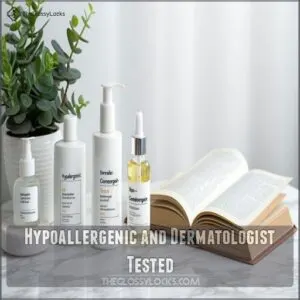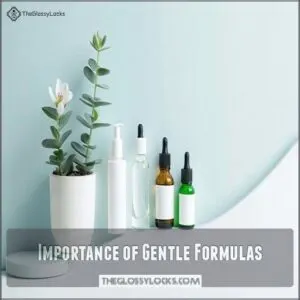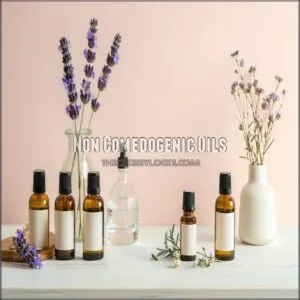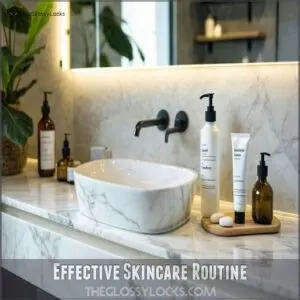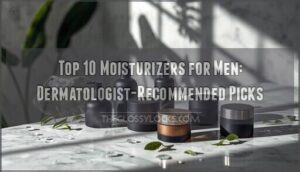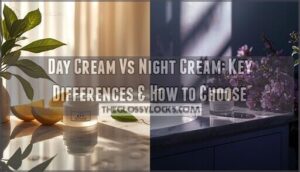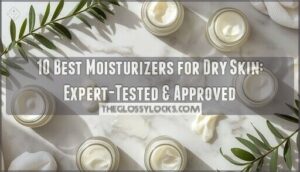This site is supported by our readers. We may earn a commission, at no cost to you, if you purchase through links.
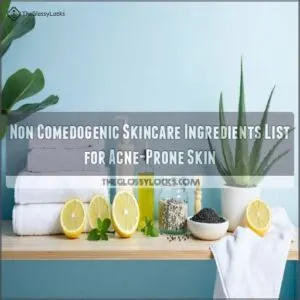
Seek out skin-loving heroes like niacinamide, which calms redness, and salicylic acid that unclogs stubborn pores. Aloe vera and glycerin will be your hydration heroes, while vitamin C fights dark spots and promotes that sought-after glow.
Dodge pore-clogging villains like coconut oil and wheat germ oil, and embrace gentle, non-irritating alternatives like chia seed and evening primrose oils. Your skin’s about to thank you for this strategic ingredient lineup that’ll keep those pesky breakouts on the run.
Table Of Contents
- Key Takeaways
- Non Comedogenic Skincare
- Comedogenic Ingredients
- Non Comedogenic Moisturizers
- Non Comedogenic Cleansers
- Non Comedogenic Oils
- Effective Skincare Routine
- Frequently Asked Questions (FAQs)
- What are the ingredients in non-comedogenic skin care products?
- What are the best non-comedogenic skin care products?
- Are non-comedogenic products good for clogged skin?
- What are noncomedogenic products?
- What is a non-comedogenic moisturizer?
- Which skincare products are non-comedogenic?
- What is the most pore clogging ingredient?
- How do I know if a product is non-comedogenic?
- What are comedogenic and noncomedogenic ingredients?
- Can diet affect my skins comedogenicity?
- Conclusion
Key Takeaways
- You’ll want to ditch comedogenic ingredients like coconut oil and wheat germ oil that clog your pores, and instead choose lightweight, non-comedogenic options like chia seed oil and evening primrose oil that keep your skin clear.
- Your skincare arsenal should include powerhouse ingredients like niacinamide to calm redness, salicylic acid to unclog pores, aloe vera to soothe, and glycerin to lock in hydration – all without triggering breakouts.
- Protecting your skin means more than just avoiding pore-cloggers; you’ll need to build a strategic routine that includes gentle cleansers, non-comedogenic moisturizers, and daily sun protection to maintain healthy, clear skin.
- When selecting skincare products, you’ve got to be a detective – always check labels for "non-comedogenic" certifications, scan ingredient lists carefully, and patch test new products to prevent unexpected skin irritation and breakouts.
Non Comedogenic Skincare
You want skincare that won’t clog your pores or trigger breakouts, especially if you have acne-prone skin.
Non-comedogenic products are designed to keep your skin clear and healthy by using ingredients that are less likely to block pores, which helps to prevent breakouts.
Benefits for Acne Prone Skin
Using non-comedogenic skincare has major perks for acne-prone skin. These acne-friendly products help prevent clogged pores, calm breakouts, and support overall skin renewal.
Here’s why they work: Incorporating an evening skin care routine can substantially enhance the effectiveness of non-comedogenic products.
- Acne Prevention – Keeps pores clear.
- Oil Regulation – Reduces excess shine.
- Pore Minimization – Refines texture.
- Breakout Control – Quiets inflammation.
- Non-Irritating – Gentle on sensitive spots.
Key Ingredients to Look For
Smart non-comedogenic skincare starts with powerhouse ingredients. Niacinamide calms redness and boosts your skin barrier. Salicylic acid dives deep, unclogging pores. Aloe vera soothes like a charm, while glycerin locks in hydration. Vitamin C, a glow-giver and dark-spot fighter.
When selecting products, look for Non Comedogenic options to guarantee the best results. These non-comedogenic ingredients avoid the pore-clogging pitfalls of comedogenic skincare, keeping your skin clean, clear, and fresh.
Importance of Oil Control
Oil control is key for acne prevention. Too much sebum can clog pores, leading to breakouts.
Look for oil control products with sebum-regulating ingredients like niacinamide or salicylic acid. These help maintain oil balance without stripping skin hydration.
Non comedogenic ingredients also minimize the risk of comedogenic skincare effects. A good oil-free skincare routine keeps pores happy and clear.
Comedogenic Ingredients
Some ingredients can clog your pores, triggering acne and blackheads. Knowing which substances to avoid, like coconut oil and isopropyl palmitate, helps you keep your skin clearer and healthier.
Common Comedogenic Substances
Some ingredients are downright pore cloggers, setting the stage for acne triggers and skin irritants.
Common comedogenic ingredients include coconut oil, wheat germ oil, and isopropyl myristate—all notorious for their comedogenic effects.
Even natural options like cocoa butter can lead to oil blockage, forming comedones.
To avoid these issues, this is a key step: check the pore clogging ingredients in your skincare products.
Steer clear of these pore-clogging ingredients to give your skin a fighting chance.
Effects on Skin Health
Comedogenic ingredients harm skin health by clogging pores, disrupting your skin balance, and increasing breakouts.
They block oil regulation, making acne prevention harder, especially for oily skin types.
Pore minimization becomes a challenge when these substances trap dirt and bacteria.
Opting for non-comedogenic skincare and pore minimizing products can help maintain skin hydration and support better overall skin health.
Examples of Comedogenic Oils
Not all oils are skin-friendly, especially for oily skin types. High-comedogenic oils can clog pores, leading to irritation.
Watch out for these:
- Coconut oil—rich in oleic acid but problematic for acne-prone skin.
- Wheat germ oil—a pore-clogging culprit despite its nutrients.
- Palm oil—its comedogenicity often disrupts oil absorption and balance.
Using non comedogenic moisturizers can help alleviate such issues.
Stick with non-comedogenic skincare instead!
Non Comedogenic Moisturizers
If you’re battling acne, choosing the right moisturizer can make all the difference in your skincare routine.
Non-comedogenic moisturizers are your secret weapon for keeping your skin hydrated without clogging pores or triggering breakouts.
Choosing Fragrance Free Options
After wrestling with pore-clogging ingredients, you’ll want fragrance free products that won’t sabotage your skin’s peace.
Sensitive skin craves gentle, natural formulas without chemical irritants, and looks for hypoallergenic skincare that whispers softly to your complexion – no harsh perfumes allowed.
Chemical free options can be your skin’s best defense against unexpected breakouts and inflammation, providing a solution with natural formulas.
Hypoallergenic and Dermatologist Tested
Without fragrance-free skincare as your starting point, hypoallergenic and dermatologist-tested products become your shield against skin sensitivity.
Dermatologists recommend carefully vetted moisturizers that promise skin safety through rigorous allergy testing.
These gentle, non comedogenic products offer peace of mind, protecting sensitive skin from potential irritants while delivering the care you deserve with dermatologist-tested products.
Importance of Gentle Formulas
Often, gentle formulas are your skin’s best defense against irritation and breakouts. In the context of non comedogenic skincare, your skin craves calm and comfort: Incorporating non comedogenic products can substantially reduce the risk of clogged pores.
- Soothing textures that don’t trigger inflammation
- Gentle exfoliants that respect skin barriers
- Calming agents that reduce redness
- Non-irritating ingredients that protect fragile skin
Choose wisely – your complexion will thank you.
Non Comedogenic Cleansers
If you’re battling acne, choosing the right non-comedogenic cleanser can be your secret weapon in maintaining clear, healthy skin.
You’ll want to look for gentle, pH-balanced formulas that effectively remove dirt and excess oil without clogging your pores or triggering breakouts.
How to Choose The Right One
After finding the perfect non-comedogenic moisturizer, you’ll want a cleanser that keeps your skin clear.
Picking the right non-comedogenic cleanser means understanding your skin’s unique needs.
Check out this quick guide to match your skin type with the perfect product:
| Skin Type | Recommended Cleanser | Key Features |
|---|---|---|
| Oily | Gel-based | Lightweight, oil-control |
| Dry | Cream-based | Hydrating, gentle |
| Combination | Foam cleanser | Balanced formula |
| Sensitive | Micellar water | Minimal ingredients |
Skin analysis is your secret weapon in finding that holy grail cleanser.
Importance of PH Balance
When hunting for the perfect non-comedogenic cleanser, your skin’s pH balance is your secret weapon.
Maintaining skin pH around 5.5 keeps your protective barrier strong, preventing breakouts and irritation.
Hypoallergenic products with balanced acidic properties help regulate moisture, ensuring your skin stays calm, clear, and resilient against potential comedogenicity triggers.
Using gentle skin products can also contribute to achieving this balance, which is essential for sensitive skin types.
Avoiding Harsh Ingredients
You’ve balanced your pH-friendly cleanser, now sidestep skin irritants that could ambush your complexion.
Harsh ingredients are acne’s secret weapon, turning your skincare routine into a minefield.
Watch out for these troublemakers:
- Sulfates that strip natural oils
- Alcohol-based products
- Synthetic fragrances
- Harsh exfoliants
- Chemical preservatives
Choose gentle formulas that respect your sensitive skin’s boundaries, using a skincare routine that promotes healthy skin.
Non Comedogenic Oils
If you’ve been battling stubborn breakouts, non-comedogenic oils might just be your skin’s new best friend.
These lightweight, pore-friendly oils can help control excess oil and nourish your skin without clogging your pores, giving you a clearer, healthier complexion.
Benefits for Skin Health
After clearing away harsh cleansers, non-comedogenic oils can be your skin’s best friend for hydration and balance.
These lightweight guardians help regulate oil production, minimize pores, and prevent acne without clogging your skin’s natural pathways.
By supporting your skin’s health, non-comedogenic products offer a gentle, protective shield against breakouts and irritation.
Examples of Non Comedogenic Oils
When battling skin woes, your oil selection can make or break your complexion.
Non-comedogenic oils are your secret weapon for healthy, happy skin.
Check out these game-changing options:
- Chia seed oil: Nature’s hydration hero
- Evening primrose oil: Inflammation’s worst nightmare
- Ahiflower oil: Balances without blocking pores
- Rosehip oil: Skin repair powerhouse
Linoleic acid is the key to keeping your skin breathing easy and looking fresh.
Using Oils for Oil Cleansing
Some people swear by oil cleansing as a game-changer for skin health. Non-comedogenic oils dissolve makeup and impurities without clogging pores, offering a gentle skincare approach.
Understanding non comedogenic properties is key to selecting the right oils. Here’s a quick guide to understand the magic of oil cleansing:
| Oil Type | Skin Benefit | Absorption Rate |
|---|---|---|
| Chia Seed | Pore Minimization | Fast |
| Jojoba | Skin Purification | Medium |
| Rosehip | Oil Balance | Slow |
Effective Skincare Routine
If you’re battling acne-prone skin, crafting an effective skincare routine isn’t just about hope—it’s about strategy.
You’ll want to choose non-comedogenic products that cleanse, protect, and balance your skin without triggering breakouts, creating a targeted approach that helps you win the war against stubborn blemishes.
Combining Non Comedogenic Products
Skincare alchemy demands strategic product synergy for acne-prone skin.
Mix non comedogenic products carefully, matching your unique skin type and concerns. Build a routine that combines gentle cleansers, lightweight moisturizers, and targeted treatments without overwhelming your complexion.
Understanding noncomedogenic products is essential to creating an effective skincare routine.
Ingredient mixing matters – watch how different noncomedogenic skincare elements interact to prevent potential irritation and maximize pore-minimizing benefits, achieving strategic product synergy.
Importance of Sun Protection
After fine-tuning your non-comedogenic skincare routine, you can’t skip sun protection. UV rays are your skin’s worst enemy, breaking down collagen and triggering inflammation. Your daily defense matters more than you think!
- Broad-spectrum SPF blocks both UVA and UVB rays
- Noncomedogenic sunscreens prevent breakouts while protecting skin
- Daily facial shields help prevent premature aging and skin cancer
Slather on that sunscreen like your skin’s future depends on it – because it does!
Tips for Acne Prone Skin Care
Since breakouts can feel like an unwelcome guest, take control of your acne-prone skin with smart, targeted strategies.
Focus on noncomedogenic skincare that helps with oil regulation and pore minimization. Choose gentle, acne-fighting ingredients that purify your skin without causing irritation.
Effective acne skin care routines often involve a combination of these strategies. Consistently use pore minimizing products, and don’t forget to patch test new treatments to prevent unexpected breakouts.
Frequently Asked Questions (FAQs)
What are the ingredients in non-comedogenic skin care products?
Wondering why your skin rebels?
Non-comedogenic skincare heroes like salicylic acid, niacinamide, and aloe vera won’t clog your pores.
They’re your secret weapon against breakouts, keeping your skin clear and confident.
What are the best non-comedogenic skin care products?
You’ll want lightweight, oil-free products with salicylic acid, niacinamide, and non-comedogenic oils like chia seed.
Look for labels promising "non-comedogenic" and avoid heavy, pore-clogging ingredients that’ll turn your skin into a breakout battlefield.
Are non-comedogenic products good for clogged skin?
Around 50 million Americans battle acne, and non-comedogenic products can help. They’re designed to prevent pore-clogging, reducing breakouts by allowing your skin to breathe and manage oil production without triggering inflammation.
What are noncomedogenic products?
Non-comedogenic products are skincare formulas designed to prevent pore blockage and acne.
They contain lightweight, easily absorbed ingredients that won’t trap oil or cause breakouts, helping you maintain clearer, healthier-looking skin.
What is a non-comedogenic moisturizer?
A non-comedogenic moisturizer won’t clog your pores, helping prevent breakouts. It’s lightweight, absorbs quickly, and uses ingredients like glycerin or aloe vera that keep your skin hydrated without causing acne.
Which skincare products are non-comedogenic?
You’ll want skincare labeled non-comedogenic, like moisturizers with aloe vera, glycerin, or vitamin C.
Look for salicylic acid cleansers, lightweight serums, and oil-free sunscreens that won’t clog your pores or trigger breakouts.
What is the most pore clogging ingredient?
Petroleum-based ingredients like petrolatum top the list of pore-clogging culprits.
Watch out for mineral oil, coconut oil, and lanolin – they’re notorious for blocking your skin’s breathing room and triggering unwelcome breakouts.
How do I know if a product is non-comedogenic?
Imagine pores screaming for mercy from pore-clogging villains!
Check labels for "non-comedogenic," scan ingredient lists for low comedogenicity scores, and patch test new products to dodge potential skin saboteurs
and keep your complexion clear and calm.
What are comedogenic and noncomedogenic ingredients?
Comedogenic ingredients clog your pores, triggering breakouts, while noncomedogenic ones won’t. Oils high in linoleic acid, like chia seed oil, won’t block pores, keeping your skin clear and breathing easy.
Can diet affect my skins comedogenicity?
Your diet might be a sneaky skin saboteur! Certain foods like dairy, sugar, and processed items can trigger inflammation and hormonal changes, potentially increasing skin’s oil production and comedogenic tendencies.
Conclusion
Ultimately, your journey to clear, radiant skin starts with a strategic non comedogenic skincare ingredients list.
By ditching pore-clogging culprits and embracing skin-loving heroes like niacinamide and salicylic acid, you’ll transform your complexion.
Remember, it’s not just about what you apply, but how you apply it. Stay consistent, listen to your skin, and watch those breakouts retreat.
Your path to healthy, glowing skin is paved with smart, non comedogenic choices.
- https://www.researchgate.net/profile/Ghanshyam-Verma/publication/341976826_An_Observational_study_to_evaluate_the_factors_aggravating_or_precipitating_acne_in_Indian_adolescent_vs_adult_patients/links/5edb919f92851c9c5e874ed3/An-Observational-study-to-evaluate-the-factors-aggravating-or-precipitating-acne-in-Indian-adolescent-vs-adult-patients.pdf
- https://www.tandfonline.com/doi/abs/10.1080/09546634.2018.1467540
- http://sciencedirect.com/science/article/abs/pii/S2468111321000530
- https://pubmed.ncbi.nlm.nih.gov/12520175/
- https://www.medicalnewstoday.com/articles/noncomedogenic




